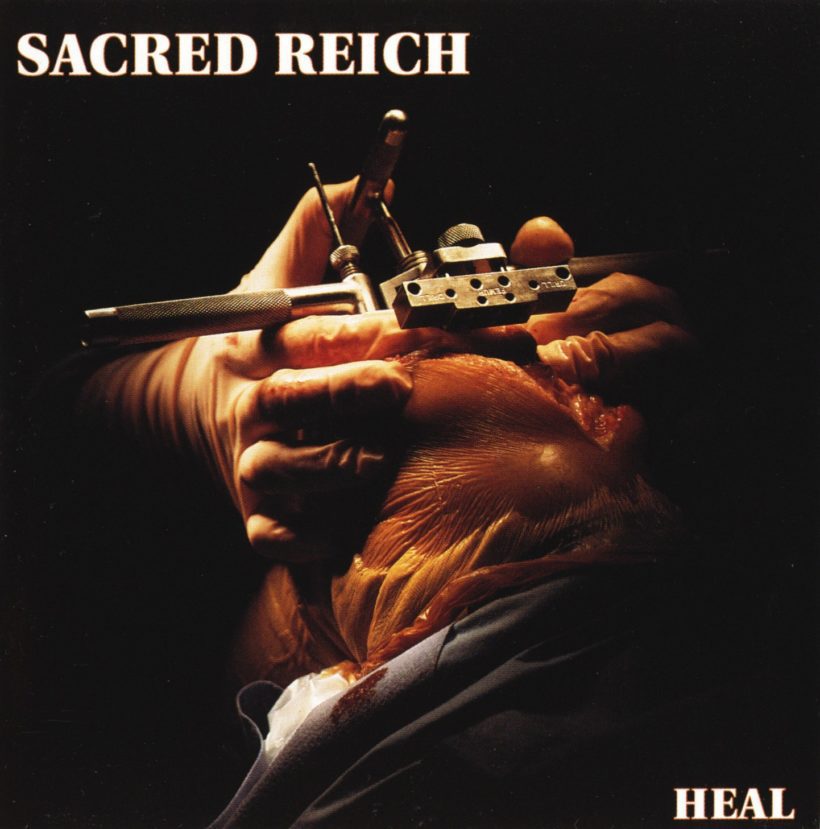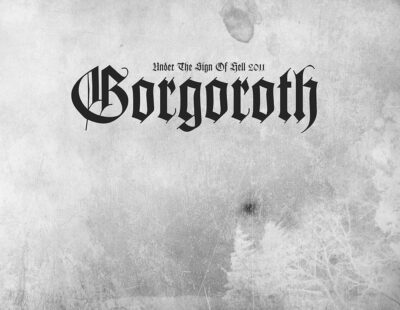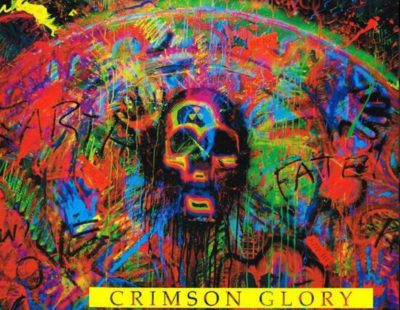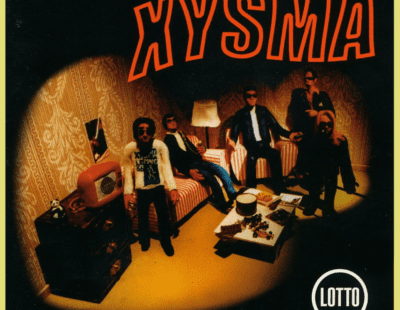
Almost every band has that album: you know, the critically and/or commercially reviled dud in an otherwise passable-to-radical back catalogue. Occasionally, a Decibelstaffer or special guest will take to the Decibelsite to bitch and moan at length as to why everybody’s full of shit and said dud is, in fact, The Shit. This time around, Greg Pratt defends Sacred Reich’s Heal.
Sacred Reich are about to drop totally killer comeback album Awakening, which got us thinking about their back catalogue, mainly what most of us considered to be quite a swing and a miss, 1996’s Heal. Upon further investigating and loud, beer-fueled listening sessions, we’ve emerged to report that Heal is actually awesome, and we’re all just remembering things wrong. It’s some Berenstein Mandela shit, man: Heal kills it.
First off, get a load of that huge production: Right off the bat, the band makes it very clear that they’re not joking around, harnessing one of the greatest “thick ’90’s metal” sounds ever laid to tape. The album also features a ton of great Sacred Reich songs; my main complaint at the time was that it was just forgettable, but maybe I had just been too spoiled by the riches of extreme metal from 1990 to 1992 to step back and absorb something that took more than one listen to really sink in. Hey, it’s not Dream Theater: it took two listens, and now I’m glad I went back and gave it the extra attention.
So today let’s take some time to re-evaluate Heal, an album unjustly left for dead by the thrash masses (or at least by me: until recently, I hadn’t spun this thing in years).
Opener “Blue Suit, Brown Shirt” totally kills it, the band kicking off the album with a fast thrash rager, playing to their strong songwriting strengths and only incorporating a hint of the ’90s groove we were worried would just suffocate this album. Super strong start to Heal, thrashing, economic, with just enough groove to keep it wildly listenable. Perfect opener; no complaints at all. I’d call this a Sacred Reich classic, which is a good indication this album is better than we’re remembering.
The title track slows things down to a mid-tempo slog but there’s nothing difficult about listening to this song. In fact, listening to it now, I wonder why it didn’t have more impact at the time, as it basically sounds like a better version of much of what I was listening to around this time. I mean, I spun that Every Mutha’s Nightmare record quite a bit around this period, yet I dismissed this? The hell? Listening back to this now, the title track is excellent, the band tapping into their moodier side with much success. A bit risky going so slow just two songs in, but the guys navigate it with ease.
“Break Through” is a fast, concise, melodic rager that picks up the pace perfectly after the looming title track then drops to an equally heavy mid-tempo stomp. Three songs in and I’m having a hard time remembering what exactly the problem even was with Heal, as “Break Through” skirts the line between melodic thrash and manic crossover that Sacred Reich always hit during their best moments. Killer tune.
Now, metal songs called “Low” from the mid-’90s make me nervous, but this “Low” is a great slow burn of a song with the band laying down some huge Pantera groove with the guitar work. Sure, it’s no-fun central, but it’s got a ton of soul and feeling, and manages to make ’96 groove-thrash totally respectable.
The band then turns around with “Don’t” and lays down a fun, brisk punk tune. Again, it shows that Sacred Reich knew what they were doing with the pacing and sequencing here, and with showing both sides of their musical personality. If the album ended after “Don’t,” it would be an incredibly strong EP.
Admittedly, things get a bit dodgy for a bit here: “Jason’s Idea” is silly and not a song, “Ask Ed” does that thrash shuffle thing that I never like, and “Who Do You Want to Be Today” is an Oingo Boingo cover (!) and made a pretty good case to be in our recent list of thrash covers we wish never happened. Those three tracks absolutely kill the momentum here, yes, so let’s just race past those but then pull back in for the final third to see what the band does.
With “Seen Through My Eyes,” Sacred Reich is back on track, thrashing hard and fast, laying down big Reich grooves, a soulful vocal performance, opening things up during the guitar solo. It’s not a stone-cold classic but it’s a great tune, the band locked in together and starting the last trio of songs here on fire, as heavy as ever, and completely no-nonsense. Again: why do I have Heal filed in my head with bad sell-out attempts at corporate groove metal? It’s not at all, and even when a song like this one stops, drops and grooves, as it does during the guitar solo, it’s never forced or chasing the dollar sign. Sacred Reich sound like they mean it.
“I Don’t Care” finds the band racing and raging to the finish line, this second to last song absolutely doing the trick, Sacred Reich sneaking in one last anthem for… well, who knows what this is actually about, but Phil Rind doesn’t care, I don’t care, no one listening cares, it’s just pure rebellion, Sacred Reich thrashing hard, and, again, me wondering why we didn’t like this album more when it dropped. Love how the song builds to its climax, the band showing a sense of drama, which works. Man, we don’t even need to finish the album: Heal has been justified. But stick around: it gets even better.
Heal closes off with “The Power of the Written Word,” one of the shortest and fastest songs on the album, the band actually getting heavier and thrashier as things wind to a close here, this song harkening back to their earlier days more than any other song on the record. But it doesn’t sound stiff or stifled or contrived at all, the band taking Heal to the finish line with a thrashing confidence, although they do take a pit stop in to groove along the way.
It’s funny, and it bears repeating because I suspect its the same for a lot of other thrashing lifers: in my head, this album is entirely mid-paced groove metal that wants to have no fun whatsoever. That’s not the case at all, and even when Heal gets a bit slower, it’s still fantastic. I can’t help but feel that this album got an unfair shake back when it came out. I know 1993’s Independent (which I could also justify all night long) was the start of what many fans thought was a two-album dud period, but, man, we’re just being picky: give Heal another listen today and you’ll see. You know what they say about time and wounds—turn this one up and let Heal work its magic.






